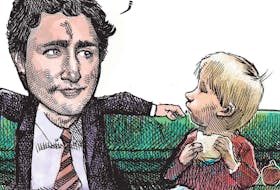“For last year’s words belong to last year’s language
And next year’s words await another voice.”
― T.S. Eliot, “Four Quartets”
In outport Newfoundland of a certain era, in the days before people asked their friends to hang or chill, children rampsed.

The Dictionary of Newfoundland English gives “rompse” as the most common usage, but where I grew up we said “rampse.” “Rompse” would have been too grand for us — as grand as saying “hi” to someone walking down the road when everyone else said “hey.”
A few coves over, they called rampsing “driving work,” as in “to engage in rough, boisterous play.”
Little girls would often play “coopy house” — or “cobby” or “copy” house, where you would pretend to have your own little homestead and act out all the routine chores your mother did at home, though there was precious little play in her world.
We didn’t copy pans but we knew boys who did.
Those were simpler times, but the language was not. It was laced with humour and salt; the lilt of poetry; rooted in land and sea.
My mother was wise in the ways of where we lived. She had fashion sense enough to know you didn’t walk up the road wearing a light-coloured raglan at a certain point in the year.
She had a myriad of expressions for describing the state of the ocean in windless weather — black calm, oily calm, flat calm.
She knew when to suggest my father wear vamps inside his logans or when he only needed gaters pulled on over his shoes. Of course, everyone knew to wear thigh rubbers in deep water, which I imagined as “tie rubbers” until I saw the words in print and realized the first “h” in thigh was optional.
If my mother was aggravated with someone, she’d “wish the cats had them.” I always tried to imagine those fierce cats, and what they might do to the person, given the chance.
Some men were sly as conners; some were sleeveens. Some went scaldraggin’ up the road in their cars — an expression that’s not in the Dictionary of Newfoundland English, or at least I can’t find it because I’m only guessing at how to spell it. Some became roary-eyed when three sheets to the wind.
My father, a mild-tempered man, loved simple things — a good feed of tomcods or fresh herring; some brawn or a mess of black puddings.
The closest to cursing I ever heard was his utterance of “Blessed Redeemer!” spat between clenched teeth after he hit his thumb with a hammer.
As a boy, he enjoyed a game of “Hoist Your Sails and Run,” which involved holding the back of your jacket up behind you like a flap and letting the wind fill it as you ran.
Those were simpler times, but the language was not. It was laced with humour and salt; the lilt of poetry; rooted in land and sea.
If you lived at the end of one outport you might be from “t’udder side of the cove,” and if you slipped in winter you might go “arse over kettle.” Those expressions did not apply where I grew up, but they did just a few kilometres away.
We played rounders and ate rounders, got itchy rashes from prickly stinger-neetles. We picked piss-a-beds in summer until it got duckish and the starrigans turned into inky silhouettes against the sky.
Will we lose these words, I wonder, as we move out of outports and into larger centres, turning further away from nature to retreat into screens and earbuds?
Will children be able to tell a blasty bough from a bedlamer? Will they still eat britches and bangbelly?
I am thankful for editors G.M. Story, W.J. Kirwin and J.D.A. Widdowson, who had the foresight to record all they could.
One beauty of language is that it is fluid and malleable, always changing and adapting, shifting to embrace new phrases and expressions.
But there’s bittersweet to that as well.
Sometimes it feels like it’s not only people who are resettled in this province, it’s dialect and idiom; our unique ways of speaking, unable to find purchase in new soil, get smoothed out and eroded as surely as waves slowly sculpt slate and shale and sand.
And that’s our loss.
Pam Frampton is The Telegram’s associate managing editor. Email [email protected]. Twitter: pam_frampton









